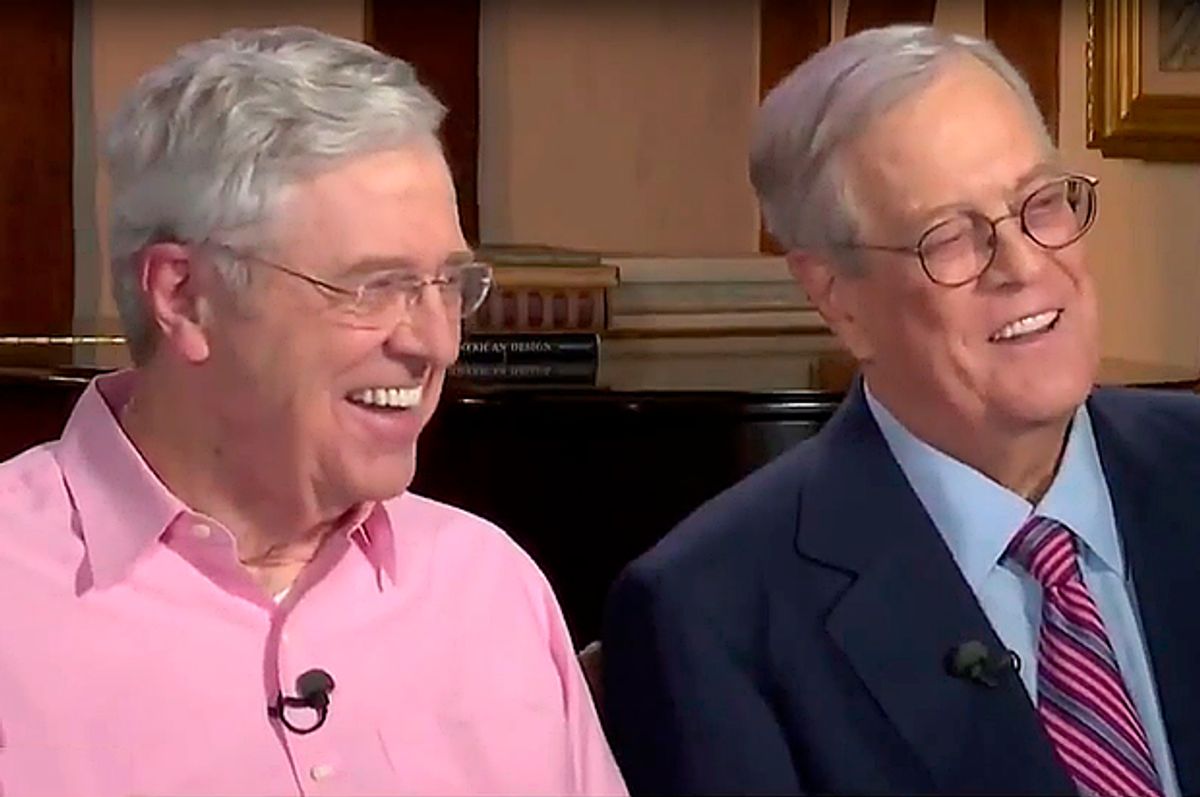Not content with having built their own parallel economy and their own parallel political party, the Koch brothers have also started to build their own parallel welfare state, Politico's Ken Vogel reports. The Kochs don't refer to their "outreach" to the poor in such terms, of course. But what else would you call this?
The outreach includes everything from turkey giveaways, GED training and English-language instruction for Hispanic immigrants to community holiday meals and healthy living classes for predominantly African American groups to vocational training and couponing classes for the under-employed.
According to Vogel, the Kochs' new beneficence is inspired, at least in part, by a desire to present "a more compassionate side of the brothers’ politics to new audiences, while fighting the perception that their groups are merely fronts for rich Republicans seeking to game the political process for personal gain." It's a PR move, in other words. Think of it as the Kochs' version of Paul Ryan's poverty tour — except more costly and, I assume, not nearly as wet.
I don't know whether the Kochs' move will pay off when it comes to their public image. It seems more likely to me that these initiatives will do little more than convince the Kochs of their own righteousness, which was probably always the real point. But one thing these public-facing of beneficence will do is make it more difficult for the Kochs and other wealthy anti-statists to claim that their politics is the result of their deeply held beliefs, rather than their base ambition.
I say that because the project implicitly undermines one of the chief arguments that the Kochs and their partisans make, which is that much of the welfare state is unnecessary. As the Roosevelt Institute's Mike Konczal detailed in an essay last year for Democracy, a popular belief on the right challenges what intuition and conventional wisdom suggest about the welfare state's rise. It didn't come about as a response to problems that the private sector and individuals couldn't solve on their own, they say. It was instead forced on Americans by power-hungry "collectivist" elites.
For example, here's something Iowa Republican Sen. Joni Ernst said in 2014 while campaigning for the job she holds today:
What we have to do a better job of is educating ... the American people that they can be self-sufficient. They don’t have to rely on the government to be the do-all, end-all for everything they need and desire. And that’s what we have fostered, is really a generation of people that rely on the government to provide absolutely everything for them.
To be fair, it would be wrong to say that Ernst is completely off-base. In a very limited sense, she has a point. While much of the welfare state as we know it came about in response to crises and changing social norms (e.g., letting poor people starve no longer being seen as OK), some of it didn't. There are indeed some elements of the welfare state that exist not because people saw no other choice, but simply because they thought some program or another was a good idea. That's a fair point.
But it's also a dramatically more limited point than Ernst or the Kochs would make. They'd be more inclined to argue that the vast majority of what the state does now could either be done more efficiently by charities and businesses, or doesn't really need to be done at all. As Sen. Ted Cruz might say, you don't really need the government to help provide women with birth control, for example, since the free market is bursting at the seams with condoms as it is!
Anyway, if the Koch brothers are now willing to concede that there are people in this country who need help securing food and an education — and that it's OK for people to be given those things before they "earn" them, because they are human beings with fundamental rights — that's super. I welcome them to the club. But if they're willing to grant all that, then the question inevitably arises: Why are they trying to make the government stop?
The Kochs might be tempted to argue that the government is inefficient, so what they really want is for those things to be done better. But that wouldn't be very honest, really, because the Kochs aren't neoliberals; they don't share American liberalism's goals but think free markets will better achieve them. They're anti-statists; they're the guys who think taxation is theft, and that any redistribution is therefore unjust. It's the welfare state itself that bothers them, not its mismanagement.
So, to return to Vogel's report, what we see is that the Koch brothers see nothing inherently wrong with redistribution — just so long as they get to decide where, how and when. And while that may be understandable on a personal level (who doesn't like full autonomy?) it is, from a philosophical angle, quite damning. Because it reveals that what bothers the Kochs so much about the welfare state isn't what it does. What bothers them, really, is that it's the rare entity whose power rivals theirs.


Shares